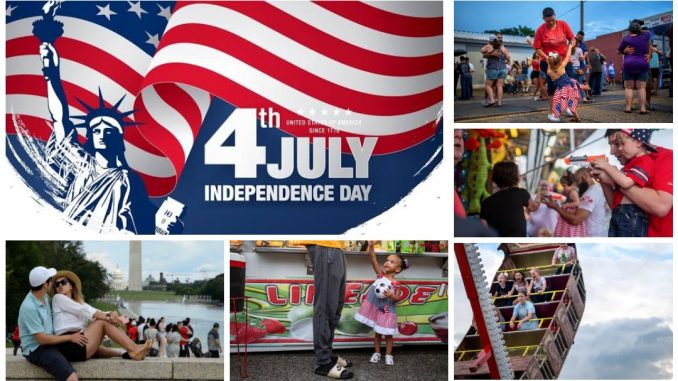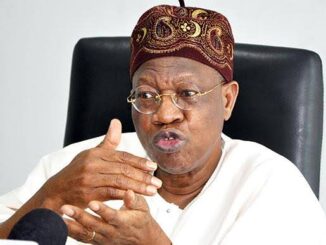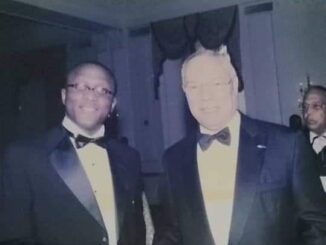
Americans mark their nation’s 245th birthday on Sunday with fireworks that may look brighter, hotdogs that may taste juicier and marching bands that may sound jauntier after the pandemic forced the cancellation of nearly all celebrations last year.
As always, fireworks displays are the highlight of the July Fourth holiday. Two of the biggest pyrotechnic shows in the country will blast off over the National Mall in Washington, and over a mile stretch of New York City’s East River, separating Manhattan from the boroughs of Queens and Brooklyn.
Some classic July Fourth events such as Nathan’s Famous Hot Dog Eating Contest in Brooklyn’s Coney Island remain scaled back to allow for social distancing in recognition of the continued threat of the COVID-19 coronavirus, which has killed more than 600,000 Americans. The more aggressive Delta variant has raised alarms about the potential for another surge among the unvaccinated.
Even so, this holiday is a time for Americans to show their patriotism and to celebrate a fresh sense of freedom in a personal sense by mingling with friends once again and enjoying summer’s simple pleasures.
But this year’s July Fourth is not entirely carefree, Reuters said. The U.S. Department of Homeland Security warned state and local police last week of a heightened threat of violence by domestic extremist groups amid relaxed COVID-19 restrictions and the approaching July Fourth holiday.
This weekend is expected to be the busiest July Fourth road travel holiday on record – with an estimated 43.6 million Americans behind the wheel, or 5 percent more than a previous record set in 2019, the American Automobile Association said.
Aleksandra Magidoff, a 12-year-old from Brooklyn, is headed to a New Jersey suburb to reconnect with a lifelong friend and her family. They were among the more than 3.5 million people who have moved out of New York, once the U.S. epicenter of COVID-19, since the pandemic started in the spring of 2020. read more
“I’m so excited – I can talk to them and celebrate with them and just socialize!” said Magidoff, who was fully vaccinated under the enormous blue whale model at the American Museum of Natural History in New York. The girls plan to gorge on “a bunch of hamburgers and hotdogs” before taking in the fireworks show at a New Jersey fairgrounds, she said.
ALSO READ: Nigeria repatriates £26.5 million pension funds from UK — PTAD
Last July Fourth she watched fireworks from her apartment building’s rooftop while under pandemic lockdown, allowed to celebrate with only her immediate family.
In Washington, President Joe Biden plans a 1,000 person July Fourth celebration on the White House lawn with essential workers and military families. read more
The president hosts the event three days after his visit to Surfside, Florida, to console families whose loved ones were in a condo tower that collapsed on June 24. Several Florida communities have cancelled their July Fourth fireworks out of respect for those impacted by the tragedy, city officials said.
Elsewhere in Washington on Sunday, marching bands will return for a traditional parade on Capitol Hill’s Barracks Row. As darkness falls, the National Mall is expected to draw big crowds to a 17-minute fireworks display set off from both sides of the Lincoln Memorial Reflecting Pool.
On New York’s East River, 50 pyrotechnicians have spent days loading more than 65,000 shells on five barges to wow audiences watching the spectacular show either in person or on television. The display is presented by Macy’s department store.
Lighting up the night’s sky not only delights crowds but also promises to restore a lifeline this year for the businesses that supply the 16,000 July Fourth fireworks displays that typically occur in cities and towns. Last year, only a “scant few” went on with the show, said Julie Heckman, executive director of the American Pyrotechnics Association.
“Approximately 70 percent are scheduled to return, and many will be bigger and better than pre-pandemic levels,” Heckman said.
But for some July Fourth will be somber.
In addition to the pall cast over the country by the pandemic and the Florida building collapse, the U.S. West faces a heightened risk of wildfires after a scorching heatwave and extremely dry conditions. And nationwide supply chain glitches tied to the pandemic have jacked up prices of everything from household items to fireworks.
“Approximately 30 percent of the consumer fireworks needed for this Independence Day either didn’t make it out of China, are sitting on ocean vessels in the Pacific Ocean waiting to berth at the ports, or they’ve been sitting at West Coast ports waiting to be put on the rail,” Heckman said.
—
The Fourth of July is celebrated as America’s Independence Day in observance of July 4, 1776, when representatives from the 13 colonies that became the United States approved the historic Declaration of Independence, a grand announcement of the colonies’ self-declared independence from England.
The Fourth of July has been a federal holiday since 1941. It is usually a day for families and friends to get together for backyard barbecues. Many cities and towns throughout the U.S. celebrate the day with picnics and parades and fireworks displays.
VOA in its report said this year, the Fourth of July may be the first time many families and friends see each other in more than a year, as the country begins to emerge from restrictions imposed in response to the COVID-19 outbreak.
The American Automobile Association is predicting a record number of cars on the highways this year, while airlines are struggling to keep up with the demand for tickets.
Face masks are still mandatory, however, on all forms of public transportation.
“We hold these truths to be self-evident, that all men are created equal, that they are endowed by their Creator with certain unalienable Rights, that among these are Life, Liberty and the pursuit of Happiness,” the country’s founding fathers wrote in the Declaration of Independence. Women were not considered equal, and many of the signers of the declaration were slaveholders who did not view slaves as equal or endowed with rights.
In July 1852, Frederick Douglass, a former slave and great orator who traveled the country and abroad to lecture about the evils of slavery, was invited to give a speech in Rochester, New York about the Fourth of July. In what is perhaps his most famous speech, Douglas asked, “What, to the American slave, is your 4th of July? I answer: a day that reveals to him, more than all other days in the year, the gross injustice and cruelty to which he is the constant victim.”
America continues to struggle with inequalities based on race and gender.




